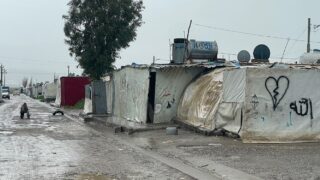Prior to the American invasion of Iraq in 2003, basic human rights were not observed there.
From the time Saddam Hussein’s regime was established and until it was toppled, everyone who opposed or disagreed with its views was doomed to die. Executions were carried out en masse: Amnesty International put the number of executions between 1980 and 1983 at 800. At the time, neither the international community nor international human rights organizations served as a deterrent; Iraq secluded itself for around 12 years prior to the ouster of Saddam.
What was happening inside the country remained unknown. Saddam bribed and deceived the organizations who visited Iraq to give a more agreeable image of the country, and to a large extent, he succeeded in doing so. Right after the American invasion, the American occupation authority annulled capital punishments, similar to the model of developed countries that respect human rights.
The law preventing the use of the death penalty was still in force until mid-2004. On Aug. 8 of the same year, however, the interim Iraqi government, controlled by the occupation authority, reintroduced capital punishment.
Alluding to the Saddam Hussein regime, the pretext under which capital punishment was reinstated was already set — trying those responsible for mass graves. During the past 10 years, successive governments kept implementing death penalties increasingly year after year, turning a deaf ear to international warnings. Iraq was classified as one of the Middle East’s cruelest countries [in terms of] implementing capital punishment. In fact, the number of executions reached record highs this year.
In the year capital punishment was reinstated, not a single execution was carried out. In 2005, however, three individuals were executed. In 2006, and according to Amnesty International, 65 executions were carried out, which led the organization to voice its concern about the growing use of the capital punishment law.
The year 2006 witnessed the bloodiest incidents: militias were deployed and started to heinously kill people based on their religious sect. Killing was carried out at random and individuals were cut to pieces using electric saws, their mutilated bodies thrown onto the sidewalks.
During that time, al-Qaeda gained ground to the detriment of American troops and the Iraqi army, and Amnesty International’s concerns proved correct. The sectarian conflict extended to the state institutions. Sunnis were banned from entering the buildings of Shiite ministers and vice versa. The then-minister of interior atrociously executed Sunni detainees using electric saws in the basements of the Ministry of Interior.
According to Human Rights Watch and Amnesty International, capital punishment, which is currently carried out in 69 countries, was often carried out in Iraq through convictions based on forced confessions. The two organizations recorded many cases that fell under this category.
What’s more, those who were subjected to forced confessions had soon reneged when appearing before the courts. Yet the courts did not take the change of testimony into consideration, even though forced confession renders the change legitimate. As a result, many were sentenced to life [in prison] or to death.
All arrests were conducted pursuant to Article 4 of Law No. 13 of 2005 on terrorism. This controversial law was criticized by local legislators and international organizations, notably the Security Council’s Counter-Terrorism Committee guided by Security Council Resolution 1373 (2001). From 2006 until 2011, the committee sent reports calling on Iraq to review the terrorism law of 2005 and set up a counterterrorism mechanism to clear up the vagueness. It also called on suggesting accurate provisions and exact definitions of terrorism in order to prevent the trials from devolving into political trials.
A preliminary assessment of this law will show that there are loose provisions, notably in Article 4, which open the door wide for interpretations and threaten public freedoms since the article allows for the trial of anyone who violates the law. The Iraqi government, however, did not show real interest in the criticism leveled against the law or the reports issued by international organization, which were sent consecutively over the course of seven years.
Article 4 defines criminals as “Anyone who committed, as a main perpetrator or a participant, any of the terrorist acts,” or “a person who incites, plans, finances, or assists terrorists to commit crimes.” The said article sentences to death the convicted individuals.
Article 4 is somehow related to the law on rewarding informers, since the arrests conducted in the areas of tension are based on the reports of intelligence officers. A number of lawyers, including Saddam Hussein’s lawyer, Badih Aref, affirmed that informants reported people who had absolutely nothing to do with terrorism. In a country where intelligence agencies are absent, informants must fill the gap within a brittle security system. The law on awarding informants, No. 33 of 2008, reads, “The investigation in the crimes under the provisions of this law shall be clandestine. The competent party conducting the investigation shall keep the name of the informer under the seal of secrecy.”
When protests flared up in many Iraqi provinces, the Iraqi government made haste to annul this law. Protesters claimed their relatives were being thrown in jail pursuant to this law, which has put the law at the top list of the protester’s demands.
Mass executions in a human slaughterhouse
The pretext for maintaining capital punishment has always been the “proliferation of terrorist operations.” Even though many executions were carried out by the successive Iraqi governments, terrorism remained at a high boil. Random arrests and torture in prisons did not deter the perpetrators. In fact, terrorist attacks claimed the lives of around 1,000 Iraqis last month.
Last April, Justice Minister Hassan al-Shammari said during a news conference that “the Iraqi government has to carry out executions given the current situation in the country.” Shammari criticized “the international reports that put Iraq at third in terms of capital punishment,” reiterating that “the Iraqi government will continue to implement capital punishment even if Iraq ranked first with distinction.” The Iraqi government insists on maintaining capital punishment; yet, it did not yet refer to a rehabilitation program that helps those engaged in terrorist acts to reintegrate into society, which led the government to resort to violence in response to the violence of militias and terrorist organizations.
Queuing for death
In 2012, 129 people were executed [in Iraq]. This year, the justice minister announced that they are waiting for a presidential decree to execute 1,500 prisoners. Additionally, 1,400 were sentenced to death and are waiting for the decision to be imposed. The numbers of executed prisoners are piling up and international organizations are counting. The UN High Commission for Human Rights likened the collective executions in Iraq to “processing animals in slaughterhouse.” In a statement, the ambassadors of the EU voiced their concern over “the Iraqi government proceeding with the executions.”
While international concerns and objections of human rights organizations are intensifying in regard to the increase of executions, armed militias, more brutal than ever, keep on claiming the lives of Iraqis on a daily basis. Does execution cure terrorism?
Translated by Al-Monitor






